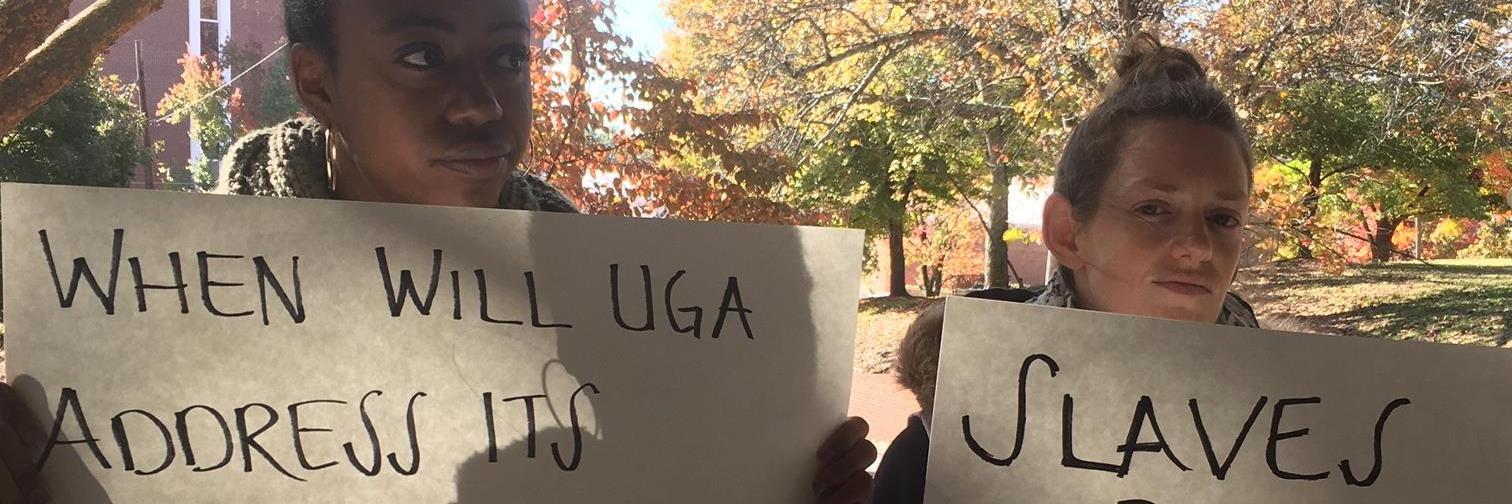Baldwin Hall Controversy in the News
More human remains found on UGA's Baldwin Hall construction site; work temporarily suspended (Athens Banner Herald, December 11, 2015). Article notes that first human remains were discovered November 17. UGA Police and the State Historic Preservation Office were immediately notified as well as GBI and the county coroner. “Based on a visual inspection by the consultant hired to assist the university in this matter, Southeastern Archaeological Services Inc., the remains are believed to be of people of European descent.” “According to state law, because it was not a crime scene and an archaeologist determined that the remains were not those of Native Americans, the removal of the remains is up to the landowner and the Georgia Department of Natural Resources.”
The bodies at Baldwin Hall: UGA uncovers 27 graves during construction project (The Guardian, December 14, 2015). The discovery of graves sparks international attention. The article echoes other contemporaneous, local accounts, reporting that university officials believed that “the human remains appeared to be of European descent.”
Bodies being removed from UGA's Baldwin Hall parking lot aren't first to be moved from site (Athens Banner Herald, January 8, 2016).
Workers found more burials than expected at UGA construction site near old Athens cemetery (Athens Banner Herald, October 21, 2016). As Anthropology students worked on the site the number ballooned from the original ‘several’ to 105.
University of Georgia to reinter remains of individuals discovered in Baldwin Hall construction (Athens Banner Herald, March 1, 2017). Article notes that “the reburial will take place in Oconee Hill Cemetery and will be commemorated with a ceremony on March 20” implying that they will happen coterminously. Article also notes, for first time, that DNA testing has proven most of the remains were African American. “Based on historical accounts, both Old Athens Cemetery and Oconee Hill Cemetery were bi-racial from their inception. Oconee Hill Cemetery is the successor to Old Athens Cemetery, so it is the logical place to reinter remains from Old Athens Cemetery. These remains are being reinterred in a cemetery historically and geographically as close as possible to their original resting place.”
UGA should reinter Baldwin bodies in African American cemetery, black leaders say (Athens Banner Herald, March 2, 2017). “‘Finally, the University of Georgia is sharing information regarding the cemetery at Baldwin Hall. Clearly, the question we started asking in December 2015 has been answered — Are these slave graves? The answer is yes,’ wrote Fred Smith, co-chair of the Athens Area Black History Committee.” “Oconee Hills does contain the unmarked graves of some people who were slaves, but it’s not the right place for the people unearthed during the Baldwin Hall construction, said Linda Davis, who has spearheaded restoration efforts at Athens’ Brooklyn Cemetery. ‘If they just put them into Oconee Hills, they’ll just be forgotten. I’d like to see them all reinterred in a place that we can bring some dignity and respect to them,’ said Davis…. ‘They need to be reinterred with their community.’”
Black leaders call on UGA to further discuss future of unearthed remains at Baldwin Hall (Athens Banner Herald, March 4, 2017). Black leaders convening at Morton called on UGA administrators to at least listen (Michael Thurmond). Fred Smith mentions reaching out to university immediately with concerns. “‘We pressed, and they did the DNA analysis,’ he said. Normally when graves are moved, there’s an effort to communicate with the next of kin, but UGA didn’t do that…. ‘I want to see these remains reclaimed by our community,’ said Davis, a leader in efforts to restore the long-neglected Brooklyn Cemetery. ‘We have nothing in Athens-Clarke County that I know of other than the Morton Theatre to say that black people ever lived here.’
Hester: Consult descendants on reinterment of Baldwin Hall remains (Athens Banner Herald, March 7, 2017). Conoly Hester deeply critical of university’s failure to consult descendants who had a better sense of the history, including the history of the slave cemetery.
In Athens, removal of human remains on campus spark anger (Atlanta Journal Constitution, March 13, 2017). Expansion of ABH article above: "They're being placed close to their white masters again," said an angry Fred Smith, co-chairman of the Athens Black History Council. "I have a belief in my heart that we still live on the University of Georgia plantation," said Davis.
UGA Has Already Reburied the Remains Found at Baldwin Hall (Flagpole, March 15, 2017). “And oh, by the way, DNA testing showed that those remains belonged to African Americans, not white people as earlier believed…. But by Mar. 7, the remains were already in the ground. UGA loaded boxes containing them into a rental box truck and—without telling anyone, and with the gates locked—reinterred them at Oconee Hill Cemetery. ‘We didn’t want to turn it into a spectacle,’ spokesman Gregory Trevor told the Athens Banner-Herald.”
UGA ceremony for Baldwin Hall remains set for Monday (Athens Banner Herald, March 18, 2017).
University of Georgia To Rebury Remains Unearthed During Construction (NPR, March 20, 2017). First national story critical of administration’s failure to confront legacy of slavery (Fred Smith) and reproduction of trauma (Michael Trinkley).
UGA plans next steps in research on Baldwin Hall site (UGA Today, March 20, 2017). Administration announces a second stage of research to find out who the 105 individuals were and how they were connected to the Athens community, “including any ties to slavery.”
UGA Holds Memorial for Baldwin Hall Remains (Flagpole, March 20, 2017). Memorial itself makes no mention of slavery.
Local NAACP President Calls for Reparations After University of Georgia Re-buries Remains of Likely Slaves (Time Magazine, March 20, 2017). “Alvin Sheats, president of the local chapter of the NAACP, wants the university to do more, including offer reparations in the form of tuition for descendants of the 105 people.” Article makes specific comparison to Georgetown. “University of Georgia President Jere Morehead said he would meet this spring with university and local leaders to discuss priorities and determine what comes next.”
Maddox: UGA made right decision on reinterring Baldwin Hall remains (Athens Banner Herald, March 21, 2017). Maddox argues that if remains had been placed in segregated cemetery, that decision would have been protested as resegregation.
Question for UGA administration after slavery conversation: What next? (Athens Banner-Herald, March 25, 2017). Article describes the “packed” public conversation, featuring University faculty and members of the community, about Baldwin Hall. The event was held in the Richard B. Russell Library auditorium.
UGA History Department and the Institute for African American Studies propose the creation of a Center for the Study of UGA & Slavery (April 19, 2017). Proposal is rejected.
Buried History: How far should a university go to face its slave past? (Chronicle of Higher Education, May 25, 2017).
Faculty group presses UGA on its slavery history (Athens Banner-Herald, March 21, 2018)
UGA: Article misrepresents university’s actions concerning reinterment of remains (Athens Banner-Herald, March 22, 2018). University spokesperson Greg Trevor notes that the university is “profoundly disappointed” with what it calls the misrepresentation of facts. The editorial especially calls out Assistant Professor Laurie Reitsema for criticism: “Ironically, Dr. Reitsema is now one of the faculty members apparently criticizing the efforts of the institution — efforts to which she was a major contributor. To the contrary, the extent of the University’s efforts demonstrate that its actions are in no way unilateral, irresponsible or unethical. It is a shame that some would now endeavor to mislead the campus and local community to believe otherwise.”
Statement on Baldwin Hall from the University of Georgia History Department (Online Athens Banner Herald, April 2, 2018). "The recent opinion piece in the Athens-Banner Herald by the University of Georgia’s Executive Director for Media Communications does not reflect the institution we recognize and love to serve. We, like so many at UGA and in Athens, have been sorrowed by our university’s repeated missteps in dealing with the Baldwin site, and the opinion piece was certainly one of them."
Former SGA president vetoes UGA monument for slaves on last day in office (Red and Black, April 19, 2018). “Douglas and her co-authors, including current SGA Vice President Charlene Marsh, began working on Resolution 30-17, calling for UGA to ‘construct a permanent, physical monument on North Campus dedicated to all enslaved peoples held and employed by the University of Georgia.’” This resolution passed the SGA senate but was vetoed by the outgoing SGA president.
Baldwin Hall memorial dedication overshadowed by protestors, including an Athens commissioner (Red & Black, November 16, 2018). “The university needs to acknowledge its role in slavery and the ways it continues to uphold white supremacy by not acknowledging that history making amends for it. This gesture, while nice, is not enough. It’s not going to bring justice to the descendants of the folks who are buried here.”
SGA Senate approves resolution encouraging UGA to recognize history of slavery (Red and Black, March 6, 2019). “Resolution 31-13 encourages UGA to build a monument on North Campus dedicated to the university’s history with slavery, dedicate the Chapel Bell in the name of two former slaves and join the Universities Studying Slavery project. Senate passed the resolution with an overwhelming majority. The author of the legislation, Senator Jessica Douglas, compared the resolution to a similar one last year which was vetoed...on [the SGA administration’s] last day in office.”
UGA Franklin College committee alleges intimidation of faculty regarding Baldwin Hall remains (Red and Black, April 23, 2019). Article announces the release of the Franklin College Faculty Senate Ad Hoc Committee on Baldwin Hall, condemning the University of Georgia’s response to the Athens and UGA communities’ concerns regarding the human remains found near Baldwin Hall in 2015. UGA administrators allegedly intimidated faculty who have conducted slavery research.
President Morehead formally responds to Faculty Senate Report (April 22, 2019). Morehead extols the "propriety of steps taken by the University in good faith, based on guidance of the State Archaeologist’s Office, in response to this unique and complex situation" and laments the Senate's willingness "to impugn the integrity and motives of dedicated employees based on an investigation filled with rumor and anonymous sources.”
UGA faculty panel, Morehead at odds on Baldwin (Online Athens Banner-Herald, April 24, 2019). Article surveys the disagreements between faculty and upper administration.


